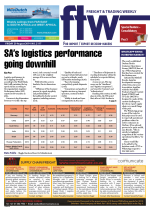Mix together the
Chinese and
consolidations
and you’ll have
the right ingredients for what
many in the industry call “one
of the world’s great rip-offs”.
And just what is that? It’s the
now infamous China import
service fee (CISF).
It’s anything but new, having
been on the go ever since 2005.
But any not-in-the-know, lessthan-
container-load (LCL)
importers who decide for the
first time to buy goods from
China will suddenly, and
surprisingly, find themselves
hit with an invoice for the CISF.
And that after the goods have
arrived.
And what is this charge all
about?
Well, in the grammatically
unsound words of E-to-China.
com (ETCN) – an information
platform officially supported by
the General Administration of
Customs and jointly sponsored
by the China Customs
Declaration Association
CCBA) and the Beijing
International Technology
Co-operation Centre (BITCC)
– it is: “(An) additional fee of
import product from China.
The agency take(s) this charge
at the port of destination and
it is (a) flexible fee, so it is
according to the negotiation
between importer and exporter
to decide who shall make the
payment. It is usually indicated
in the contract that who should
make the payment and it is
not directly related with the
government of China.”
Once you have struggled
through that, you will realise
that it still doesn’t tell you why
it is there in the first place.
It started in October 2005,
when – for LCL shipments
– Chinese transportation
companies introduced the
CISF for no other reason
than to further finance their
operations. LCL business is
not in high demand because
exporters favour full container
loads (FCL) as China is a mass
quantity market.
Therefore, the
deconsolidation agents in the
foreign destination ports will
charge the CISF through the
foreign consignee and not
through the exporter.
This fee is then fed back to
the consolidator in China.
There are ongoing disputes
about whether this charge
is legally valid. But, as yet,
no court findings have been
reported from anywhere in
the world.
It is best to remember the
words from ETCN. It is a
flexible fee, so the importer
and exporter have to negotiate
on who shall bear the cost
and the decision is usually
indicated in the contract.
The crux of the matter is
that a buyer of goods needs
to set out and agree with his
supplier the precise terms
under which the goods are
sold before placing an order
to avoid unexpected charges
on arrival of the goods at the
point of delivery (POD).
There’s no formula to work
out just how each CISF amount
has been calculated – it’s purely
at the discretion of the Chinese
supplier.
But it doesn’t matter what
it is – inflated charges, CISF,
or whatever – it is up to the
importer to negotiate this with
the supplier, and be sure of just
who is liable for what.
Also, it’s no use the importer
deciding to go cost, insurance,
freight (CIF in Incoterms),
and expecting that that’s
all he’ll pay for. Any other
surcharges along the way,
from whatever source, can
still be added to the final
landed charge. And it’s a
case of pay up and argue
later – else he won’t get his
goods delivered.
Maybe it’s better to go free
on board (FOB) or ex-works.
Then you’d be in charge of
all the costs along the way.
But that’s where a Catch
22 raises its ugly head. If
you do this, then the supplier
will tell you that he can’t
offer you the same attractive
price. And you’ll still have to
pay more in the end.
According to Mike
Walwyn, chairman of the
Cape Port Liaison Forum
(PLF) and vice chairman of
the SA Association of Freight
Forwarders (Saaff), this
unique Chinese charge is just
about inescapable.
“I’ve had it out a few times
with consolidators,” he added,
“and had occasional refunds.
But mostly they say they have
to pay this to their overseas
source.”
So stay awake when you’re
dealing with the Chinese and
consolidations, or the CSIF
will come along and bite you.
China import service fee not going away
29 Aug 2014 - by Alan Peat
0 Comments
FTW - 29 Aug 14

29 Aug 2014
29 Aug 2014
29 Aug 2014
29 Aug 2014
29 Aug 2014
29 Aug 2014
29 Aug 2014
29 Aug 2014
29 Aug 2014
29 Aug 2014
29 Aug 2014
Border Beat
Featured Jobs
New
New
